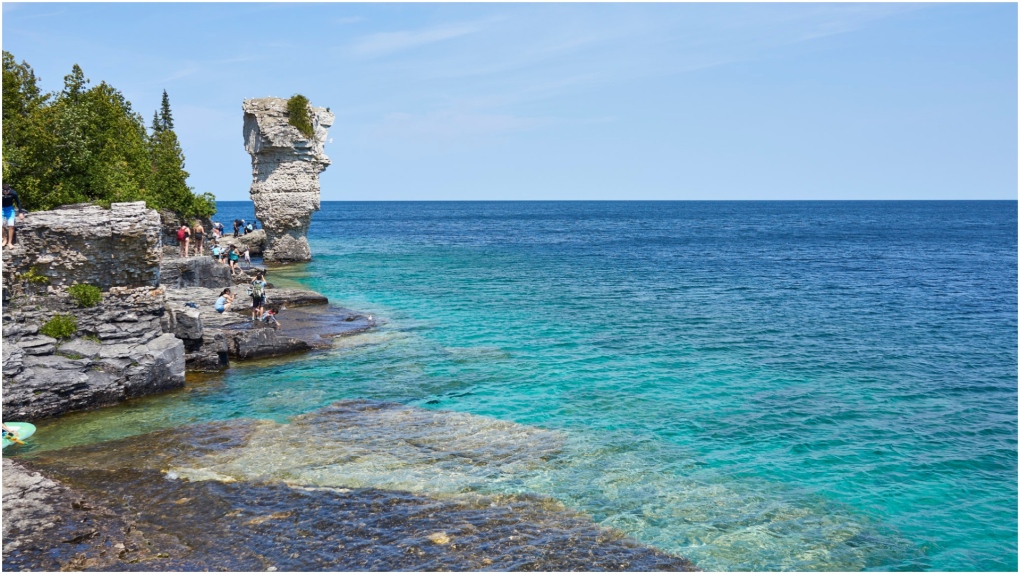Ontario announces plan for staycation tax credit and here's how it works
The Ontario government has announced its plan for a staycation tax credit.
Anyone planning a getaway within the province in the 2022 tax year could be eligible under the new "Ontario Staycation Tax Credit" program.
The program was announced as part of the Ford government's Fall Economic Statement, which was tabled on Thursday.
Ontarians would get a 20 per cent personal income tax credit on eligible accommodation between Jan. 1 and Dec. 31, up to a maximum of $1,000 for an individual and $2,000 for a family, for a maximum credit of $200 or $400 respectively.
Ontario residents could apply for this refundable credit when they file their 2022 personal tax returns and benefit even if they do not owe any tax.
 Tobermory, Ont. is seen in this undated photo. (Flickr)
Tobermory, Ont. is seen in this undated photo. (Flickr)
According to the government, an eligible accommodation expense would have to be:
- For a stay of less than a month at an eligible accommodation such as a hotel, motel, resort, lodge, bed-and-breakfast establishment, cottage or campground in Ontario
- For a stay between Jan. 1 and Dec. 31 of 2022
- Incurred for leisure
- Paid by the Ontario tax filer, their spouse or common-law partner, or their eligible child, as set out on a detailed receipt
- Not reimbursed to the tax filer, their spouse or common-law partner, or their eligible child, by any person, including by a friend or an employer
- Subject to Goods and Services Tax (GST)/Harmonized Sales Tax (HST), as set out on a detailed receipt.
The government said this tax credit will help the tourism and hospitality sectors recover and encourage Ontarians to explore the province.
The credit would provide an estimated $270 million to support over one-and-a-half million families to further discover Ontario, the government said.
Ontario NDP Leader Andrea Horwath said Thursday she believes the staycation credit won't help families and says it should have been a full $1,000 refund on costs spent on a vacation in the province.
"This thing that is in the update today - about $200 is what it comes out to - that's really not going to help families a great deal," Horwath said. "That's why our $1,000 tax credit idea might be helpful to some families who normally would have taken that vacation right now."
CTVNews.ca Top Stories

'It's a giant mess': Confusion remains about the GST/HST holiday
The organization representing small and medium size businesses in Canada says the start to the GST and HST holiday has been 'a giant mess.'
Donald Trump says Canada becoming 51st U.S. state is 'a great idea.' Jean Charest calls the comment a 'wake-up call'
U.S. President-elect Donald Trump is taking aim at Canada once more, saying it would be 'a great idea' to make it America's ‘51st state.'
'You're either with Beijing or you're with Washington': Ford says to Mexico in CNN interview
Ontario Premier Doug Ford has a message for Mexico as the threat of tariffs by incoming president Donald Trump hangs over both sides of the U.S. border.
'Why would I box myself in?: Singh on why he won't commit to helping bring Trudeau's gov't down, yet
NDP Leader Jagmeet Singh says U.S. president-elect Donald Trump's looming tariff threat is part of the reason why he's not committing to voting non-confidence in Prime Minister Justin Trudeau's government.
NEW Here's how the cost of living challenges are shaking up Canadian seniors' retirement plans
With the high cost of living increasingly a concern, some seniors are making sacrifices to help their adult children and grandchildren make ends meet. Here are some of their stories.
B.C. man drops camera into ocean, accidentally captures 'breathtaking' whale video
Before it turned into an extraordinary day, Peter Mieras says it began being quite ordinary.
What's the best treatment for ADHD? Large new study offers clues
Stimulant medications and certain therapies are more effective in treating ADHD symptoms than placebos, a new study on more than 14,000 adults has found.
Chicago man visits Michigan to return overdue book after 50 years
A Chicago man is trying to turn his honest mistake into something positive after forgetting to return an overdue library book to his childhood library in Warren.
There are 88 new Order of Canada appointees. Here's a look at some of the most notable names
Ryan Reynolds, Scott Oake and Maureen Ann Jennings are among the 88 new recipients of the Order of Canada.
































